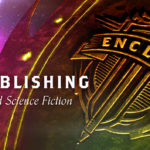What Does The Reader Say?
 I’ve been involved in the Christian writing community since January of 2006. In that time, I’ve heard one complaint over and over again:
I’ve been involved in the Christian writing community since January of 2006. In that time, I’ve heard one complaint over and over again:
Christian speculative fiction has a low bar on quality to get published compared to the general market.
Publishers distributing to CBA (Christian Bookseller’s Association) bookstores are said to be more concerned about whether a book contains no cussing, sex, and drinking; and that it contain Bible quotes, stereotypical perfect Christian, and a Gospel presentation in some form, than they are about the quality of the plot, believability, and descriptive writing.
As Rebecca LuElla Miller has pointed out on more than one occasion, there are several quality speculative fiction titles in the CBA that would counter the above argument. I don’t doubt she is right, and I’ve not read as widely among CBA titles to agree or disagree with integrity. The few I’ve read fall into two categories.
I’ve read the first book in Donita K. Paul’s Dragon Keeper series, DragonSpell. I’d rank that high on the quality meter. I also read a book, I don’t remember the title but I believe it was published by Bethany, touted as a good example of CBA science fiction. I lasted about five chapters waiting for something to happen before giving up. That, and the Christianity felt too tacked onto the characters.
Before you read on, if you missed my article last week on my definition of Christian fiction, you may want to do so now in order to know what I’m referring to by the term.
The CBA is no longer the only Christian market.
The advent of Print on Demand, ebooks, and internet retail has opened the door for books unable to be published through CBA channels. In some cases, this has brought quality Christian fiction to readers that otherwise would have remained hidden in publisher and agent slush piles. It has also brought a slew of low quality work that would have been rejected at most publishing houses.
But this is a growing market. More and more, Christian speculative fiction readers are discovering the great choices available to them.
Marcher Lord Press, publishing Christian speculative fiction, proved the viability of this non-CBA market by the fact that Jeff Gerke, the owner, was able to sell it to a leading Christian literary agent, Steve Laube, on January 1, 2014.
Whether through small presses like Splashdown Books or via self-publishing, the Christian market has expanded in recent years beyond the gardened walls of the CBA.
I want to hear from non-writer readers what they believe is quality Christian speculative fiction.
I know, I know. Writers are readers too. The bulk of us are. However, because we are writers, we pay attention to things a reader may not care about. We can easily get “thrown out of the story” over the slightest error, especially if it is our pet issue. Because we are readers who write, we often view the quality of a story from within that literary bubble.
This is a chance, if we get enough input, for readers outside the writing bubble to gift us with their expectations, whether we are published by a traditional Christian publisher or outside the CBA channel.
I’m not suggesting that writers don’t respond at all, but let us know you are one and let’s give non-writer readers a chance to define what is quality Christian fiction for them. First, let’s get one issue off the table.
Readers expect to be able to read the story!
I believe most everyone, writers and non-writer readers will consider the following a basic must have in quality: Don’t Moon People your story.
What do I mean by that? I’ll let one of the many fake 5-star reviews for the book explain it.
Moon People has reshaped my literary perceptions. After reading the heroic story of Captain David Braymer, 1st Science Officer of the space ship USS Lunar Base One, I feel as if I have been unbound from the restraints put in place by a dozen English teachers. “Amazing”, I said to myself, when I realized the linguistic flexibility that comes from releasing character speech from its quotation marks. There is a certain joy that comes with exercising the freedom to end a sentence on any punctuation, even a comma. Question marks needn’t be for interrogative statements! Must we bind every interjection to an exclamation point?
For a sample, try reading the blurb of Moon People 2 without getting a headache. Writers, don’t do this to your readers, or you may find you have very few left. We should strive to have the least typos, grammar mistakes, and distracting formatting possible.
With that quality benchmark as a given, now we writers want to know: what do the readers say? What says to you, “This is quality fiction,” in the Christian speculative fiction market?









































Really great Christian fiction isn’t preoccupied by being Christian. ND Wilson’s Ashtown Burials is a great example. His Christianity is buried so deeply in the story world, it couldn’t work without it. It’s wonderful (and totally action packed!). The Wingfeather series is also busy telling a compelling story in a Christian-themed world.
So, Kessie, what I’m hearing you say quality Christian fiction involves:
1. A compelling and engaging story, which would involve a well constructed plot and characters.
2. Christian theme(s) integral to the story but not overt or self-conscious about it.
“The world does not need more Christian literature. What it needs is more Christians writing good literature.” -C. S. Lewis
While I think it’s important for an author to be aware of what audience they’re writing to and what sort of content they put in and to portray the message God puts on their hearts, I agree that Christian fantasy is rather sorely lacking in quality.
As a matter of fact I had started becoming quite discouraged with it until I discovered Anne Elisabeth Stengl’s The Tales of Goldstone Wood which rank right up there (above in my opinion) in quality with the classics and bestsellers in the fantasy market.
I truly hope that more and more Christian writers will show how a story can be written with incredible beauty and power.
Thanks for the input, Hannah.
What type of elements do you think go into making a story powerful and beautiful? Or to put it another way, how do you “measure” that for yourself?
Well, my answer about “quality” in my English major capacity would be different than my answer about “quality” in my casual consumer capacity. The two aren’t mutually exclusive, but there’s a different set of expectations. The casual consumer expects more entertainment, while the snobs expect some sort of mental/emotional challenge. Y’know, like when they trot out that line “real art is offensive,” they mean that real art challenges your presumptions and expectations (though for the moment I’m not touching the question of what “real” art is with a ten-foot pole). But there are just some times when I want to read a JD Robb with snappy dialog and a fairly predictable but inventive enough murder mystery plot. JD Robb is my literary junk food, but at least Robb is good with character.
I must say that my “English major side” and my “reader side” do have different terms, but the same tastes. I prefer distinctive worlds and characters, and plots of discovery and character growth.
Thanks for this post, and the previous one. For what it’s worth, I have attempted to answer the question, “What is a Christian novel?” here: http://sunandshield.blogspot.com/2013/02/what-is-christian-novel.html
I’m not very satisfied with the answer, but, in summary, here it is: A Christian novel should include three things. First, some sort of important choice between good and evil. Second, there should also be evidence that a character has hope, beyond despair. Third, such a work should also contain at least one of the following, as a significant part of the plot, or the theme, or as an attribute of an important character: 1) A Christ-figure 2) Belief in important orthodox Christian doctrine, on the part of a narrator or character 3) Practicing prayer to a monotheistic divine being 4) Having a relationship with such a monotheistic divine being in other significant ways, including receiving guidance from him, or being placed in his presence.
The post discusses the Narnia books, Tolkien, and Ursula K. Le Guin (who does not meet the criteria!)
I’m not sure I agree with how you phrase your criteria. Jews or Mormons might also have characters “practicing prayer to a monotheistic divine being.” Also, a character may believe in Christian doctrines and state that, even as that character is being written by a non-Christian.
You’ve identified important distinguishing marks for Christian novels that we need to be looking for, but I think the point is that we’ve focused too much on these criteria and neglected to practice quality writing that can compete with “secular” books.
My favorite example of a Christian author “making it” in the secular publishing world is John Grisham. He has top-notch writing, and his themes are subtle, but they reflect Christian values–mostly without ever hitting a criterion of Christian fiction.
Interesting, Martin. Like Alex, I’d probably not fire on all those elements.
But that’s why I did the last post on what is Christian fiction, so folks would know what definition I’m using by the label. Christian theme targeted to a Christian audience.
Whoa there, I would just like to clarify that Christ figures are not a terribly good indicator of Christian interest in any given piece of fiction. It’s a trope to be used like any other trope. Hemingway’s “The Old Man and the Sea” has a Christ figure, and Steinbeck’s “The Grapes of Wrath” has at least one, possibly two, and none of them are…what’s the word I want? Sophisticated? Dignified? Steinbeck’s preacher man might even be considered offensive to some in how mystical-woo he leans. Though Steinbeck was obviously trying to invoke Biblical imagery and metaphors, just with LOTS of socialism.
Thanks for the feedback.
I guess the question of what a Christ-figure is should be clarified. To me, a Christ-figure sacrifices him or herself, at risk of death, or even in death, so that others may be freed or redeemed. The real Christ-figure also returned from death. Fictional Christ-figures don’t have to do that. Gandalf was a Christ-figure. So was Aslan.
Does a Christ-figure have to be dignified? I’m not sure.
Does there have to be a Christ-figure in a work of Christian fiction? No. There may be other evidences of a Christian world-view.
Other people might legitimately mean other things by the term.
Yes, other people might mean other things by the term, but it’s good for them to clarify meanings when they use terms that have fairly commonly known technical meanings. You mean Christ figure more in the sense of copy-paste allegory, while Christ figure in the general lit snob terminology is less specific than allegory.
For me, what makes good fiction is an excellent story and well-developed, three dimensional characters. What makes good “Christian” fiction is both these things and a strong sense of hope throughout.